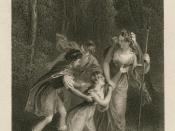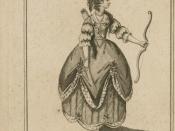The most successful of Shakespeare's plays during his time and, in modern day, the most dismissed and controversial, "Titus Andronicus" provides its audience with an intimate and powerfully shocking view of what was considered humorous in the Elizabethan age. Shakespeare use of humour in this play depicts how the people of this violent time dealt with the day-to-day tragedy of living.
During the Elizabethan age, people were well accustomed to public executions, beheadings at the London tower, and took delight in spectacles such as bear baiting. Living in the time of the plague, death was no stranger nor shocking to Shakespeare's contemporary audiences; in essence they were experienced with death and the spectacle of violence was commonplace. Elizabethan audiences wanted to see murder and chaos onstage. Shakespeare merely gave them what they wanted with "Titus Andronicus."
Voyeurism of this type was acceptable for all walks of life with the audience remaining guiltless spectators.
While the idea of violence as humorous is still central in a great deal of our popular culture, modern audiences have become more reserved about admitting it. Our desire for viewing violence has not changed so much as the manner in which it is acceptable to view it.
The violence in Titus reflects the extreme brutality of the age in which it was written. However, to say that it is merely an early model of revenge tragedy would be to look no deeper than the surface of the play and dismiss the black humour that runs throughout. This humour shows up during some of the play's most horrific moments as if in counterpoint; a balancing of darkness with jest.
Shakespeare, well known for his upfront humour regarding sex, does not disappoint in Titus. In an exchange between Aaron and Chiron it...


